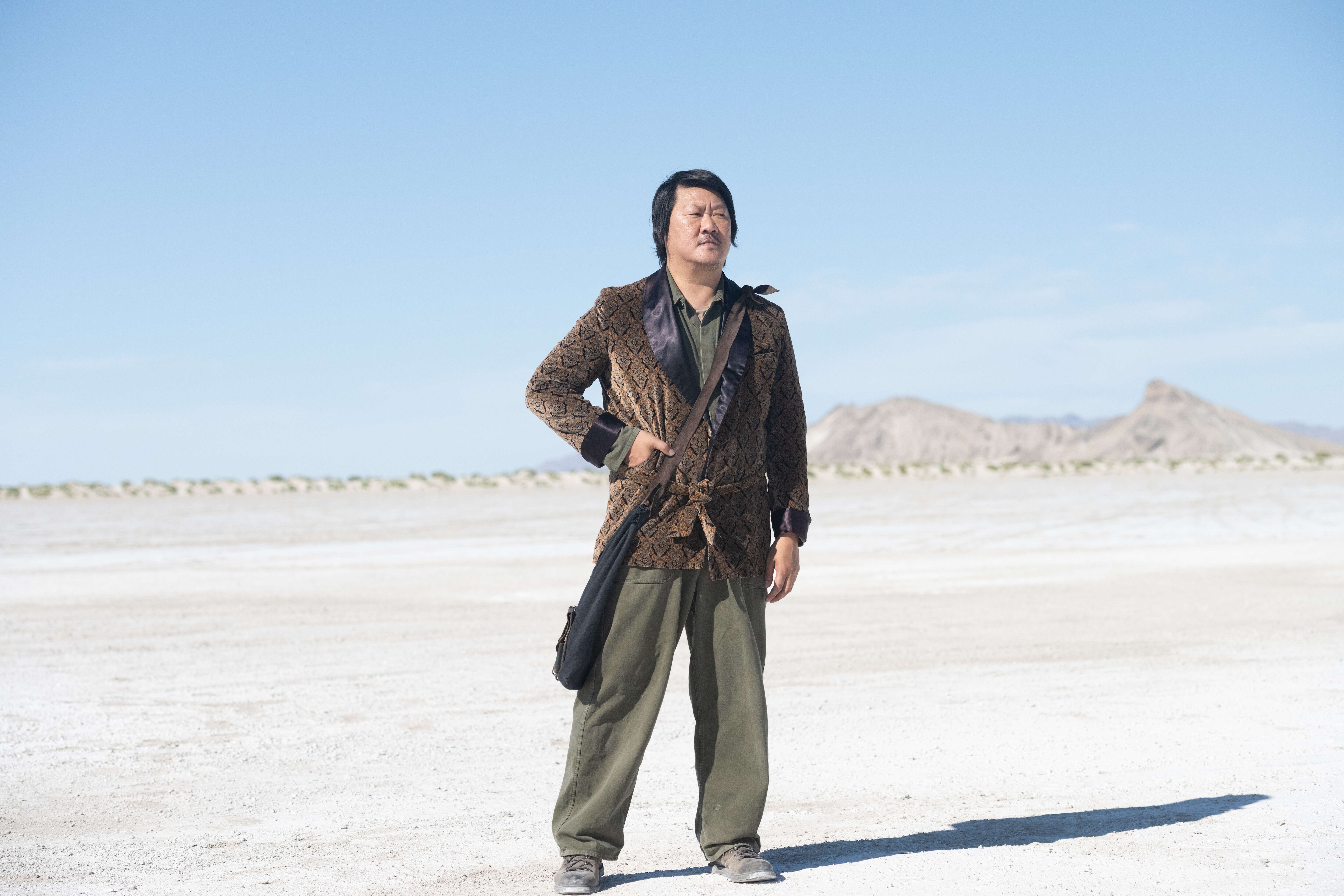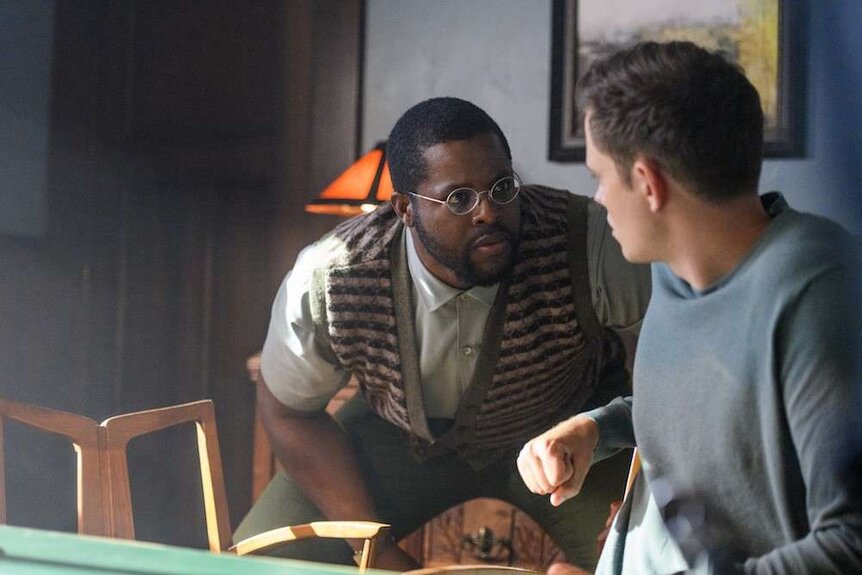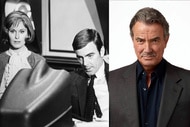Create a free profile to get unlimited access to exclusive videos, sweepstakes, and more!
Benedict Wong reflects on his thoughtful, non-MCU adventure with Winston Duke in 'Nine Days'

How did we get here, and what comes next? Those are the questions humanity has been grappling with since the dawn of, well, humanity. Religions and philosophies exist because of those questions, with no definitive answer yet provided. And it's no wonder that filmmakers find it to be such fruitful ground for exploring their own “what if” theories about how our souls came into our bodies, and then carry us to whatever may be next.
For first-time film director, Edson Oda, the extremely personal occurrence of a family member dying of suicide churned up those questions for him, and it inspired him to write and direct the Sony Pictures Classic release, Nine Days, which opens in theaters on July 30.
In Nine Days, Oda presents a supernatural scenario where souls are reviewed by arbiters that determine each candidate’s potential as a future person. An ever-revolving series of applicants are observed and tested across nine days, with that lone judge determining the one that gets to be born and live a lifetime of experiences. In the film, Winston Duke is Will, a judge who observes the lives he approved on TV screens, cataloging their successes and failures, while moving through his next group of souls. A fellow judge, Kyo (played by Benedict Wong) has a long history with Will, and he is concerned that the latest group isn’t getting a fair shot.
Existential, heartbreaking, and even darkly comedic at times, Nine Days, premiered at the Sundance Film Festival in February 2020 right before the pandemic. Oda won the Waldo Salt Screenwriting Award and both film and Wong were nominated for the 2021 Independent Spirit Awards.
SYFY WIRE recently spoke with Wong over Zoom, and he explained how he found his way to the salt flats of Utah playing god with Duke and a cast of superb character actors including Zazie Beetz, Bill Skarsgård, and Tony Hale.
Was it the Nine Days script or Edson Oda that wooed you into the cast?
It happened to me in stages. The process of receiving the script and sitting down with It and marveling at that. And then wanting to meet Edson who surprised me that he was a first-time feature director. Sitting with him and then gradually finding out there’s a constant cathartic space for him to heal through art like this. I wanted to tell the story with him on all of those bases. And I felt that, as did everyone else, really. All of a sudden, I found myself in Utah. And everyone had 24 days to make this film and we went at it.
The script has a large ensemble. Did Edson always want you for the cheerful observer, Kyo, who always watches the TV screens, and souls, with such investment and care?
Yeah. He wanted me for Kyo who is probably, like, the oldest character, but he's the biggest kid. I kind of relate to that. [Laughs.]
Kyo has never experienced life but he has such empathy for it. What appealed to you about playing his predicament?
He's sort of caught up in his own personal purgatory. He's never been alive, but yet, he's still a romantic about life, you know? He vicariously lives through all these screens. He's just trying to cherish moments everywhere. You've got someone who's got a real appetite for life, but yet has never lived. It's kind of this weird tragic juxtaposition constantly.
How would you describe Kyo's role with Will?
He's his co-worker, and he's there to call him out. There's a real heartbreak and frustration that he's seen Will in the screen, and as he's seeing him now. He's trying to help him out of his fog.
When did you first meet Winston? Was it MCU-related?
We met at the Doctor Strange premiere. He said, “Hi, I'm Winston Duke. I'm doing this film, Black Panther." I had no idea what Black Panther was. And then I did! [Laughs.] And then Nine Days happened. I found out we were working together, which was a real thrill. We'd had lots of laughs previous to that, but this wasn't as funny. Just the energy emanating was kind of making the crew feel depressed. They were glad when they saw me. [Laughs.]
There's almost a theater vibe to the whole movie, like it could be a stage play. Did you approach your scenes with Duke with extra rehearsals or talk through the script much?
I always remember just myself, Edson, and Winston just in this room combing through the script. And it was great. We'd all traveled away from our homes. And once you were in Utah, I could just go all day long. I'm here, so we could just, whatever, whenever. And everybody cared a lot about making this film.
The film asks us to think about some big life questions. Between takes, did the cast mull over your existential outlooks?
We had the first initial cast dinner. And then I tried to keep myself I locked myself up in a room in the Travel Lodge and stayed there. I didn't talk to anyone, solely just to have personal isolation. And when I came out, I wanted human contact, so that was like Kyo who would walk off into the dead of night, and no one knows where he goes. I think with the 24 days that we had, we very much got on with it. Though, I think some of them managed to go on a horse trek. I didn't want to do that because it felt too much of a holiday for me. I just needed to be in the moment. Now, they owe me a horse trek. [Laughs.]
Do the empty plains that Kyo has to traverse to Will's imply meaning to you?
Well, there are wandering lost souls around. And Kyo can knock on [Will's] door and come back in. I don't know what that means. I don't know what that metaphor is. But with human existence, some people have darker phases where we go into ourselves, and then we do turn up. We can sometimes put on a mask anyway, or whatever too.
Sundance really embraced this film. What do you hope the wide release will mean for wider audiences who see it?
What feels wonderful about this film now is people can enjoy this as a movie itself. But there is this point where it reflects back at you as an audience member, and you have this moment of your own personal choice cherished moments, or deeper, meaningful things that resonate within you. To have that coming from the germination of Edson trying to deal with what was happening with his uncle, to making this piece, and that permeating through is something. I was at Sundance, and they were audience members, like an Asian family with the mother crying and saying, "I have to go and call my son to tell him I love him." It was almost like there's a different strand going on from our movie and moving out somewhere else. Even a war veteran with PTSD came over said, "That's me. I'm Will." He felt seen. It's having a real healing process.
Nine Days opens in Los Angeles and New York City theaters on July 30, followed by a nationwide expansion on Aug. 6.















